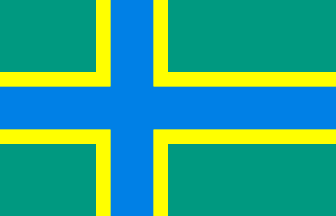
Last modified: 2021-08-26 by valentin poposki
Keywords: vepsia | cross: scandinavian (blue) |
Links: FOTW homepage |
search |
disclaimer and copyright |
write us |
mirrors
 image by Tomislav Todorovic, 15 September 2018
image by Tomislav Todorovic, 15 September 2018The Vepsian flag
is a green [blue] field with a blue cross
with yellow borders. Andersson
[and92]
[and94]
does not mention this one.
Jan Oskar Engene, 20 Mar 1996
The Vepsian flag, a green [blue] field with a blue Scandinavian cross bordered
yellow, was “adopted” in June 1992 at the Vepsian Summer
Festival in the Vepsian national village of Kalajoki (Rybreka) near lake
Onega in the Republic of Karelia. The colours of the
flag symbolise the forests, rivers, lakes and fields of the region. I am not
aware of the exact shades but I would suppose that the green is the same as in
the East Karelian flag.
Marco Pribilla, 10 Jan 2003
According to [lau97], the
Vepsian flag uses the same proportions as the
East Karelian flag.
Marco Pribilla, 10 Jan 2003
This flag, with medium blue, is listed under number 89 at the chart
Flags of Aspirant Peoples [eba94] as:
«Vepsians - North-West Russia».
Ivan Sache, 15 Sep 1999
At this site:
https://cr2.livejournal.com/460975.html (photo)
a photo of a Vepsian flag is presented, which was taken at the Vepsian
Ethnographic Museum in the village of Shyoltozero, Karelia in 2015. On this
flag, the cross is in a shade of blue which is lighter than FOTW color B, but
darker than B-. It is also visibly wider and its vertical arms are a bit closer
to the hoist than in the East Karelian flag.
In the photo, field
color looks like a greenish shade of blue. Through my correspondence with
Viktor Lomantsov (August-Spetember 2018), I have learned that it is actually
a distinctive shade of green called "sea wave green" in Russian, which often
looks very close to blue in the photos. The flag image employing these shades
is now also presented at Vexillographia website:
http://www.vexillographia.ru/russia/minority.htm.
Tomislav Todorovic, 15 September 2018
The Vepsians, also known as Veps, speak a language belonging to
the Finno-Ugric branch of the Uralic language family. They live in
the area south of Karelia,
between the lakes Ladoga and Onega
[in Leninigrad Region].
In the 1989 Soviet census, they were numbered at
12 501.
Jan Oskar Engene, 20 Mar 1996